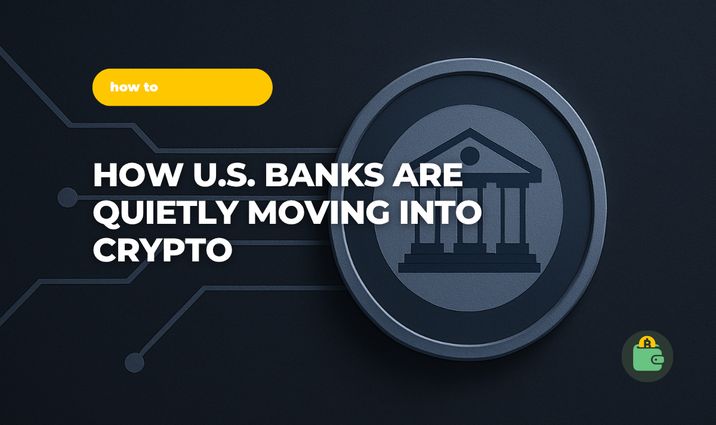How U.S. Banks Are Quietly Moving Into Crypto – And What It Means for You

Crypto legalization is irreversibly leading to its integration into traditional banking systems. On the one hand, this is likely to help more people feel comfortable using crypto and become part of the global financial market. On the other hand, it means that the very concept of crypto is starting to change in the process. For example, some crypto platforms and services have already lost their transparency — and even their independence from global governments.
But what do these shifts mean for the average crypto user?
The Ability to Pay with Crypto
After the CLARITY and GENIUS Acts were signed, American banks have increasingly begun discussing the issuance of their own dollar-pegged stablecoins. For example, Bank of America (BofA) confirmed in July 2025 that it is developing a USD-backed stablecoin and is ready to move forward as soon as the optimal scale and partnership model are determined.
Another giant, Citigroup, is also exploring the issuance of its own digital token — CEO Jane Fraser told analysts directly that Citi is considering launching “CitiCoin” to facilitate digital payments.
JPMorgan is another example: it launched a prototype of the JPMD deposit token in June 2025. Based on blockchain technology, it essentially represents digitized bank deposits for settlements — a further development of the concept of a closed-loop banking stablecoin.
Some European banks have also tested accepting cryptocurrency payments from customers with instant conversion. In Switzerland, for example, several private banks (Maerki Baumann, Basler Kantonalbank, etc.) have been offering customers the option to deposit and store cryptocurrency in their accounts since 2019–2020.
In the near future, we will probably see crypto become available for everyday use.
Investments in Crypto
Basically, investing in crypto and crypto trading have become regular activities in today’s financial markets. Previously, you had to use dedicated crypto platforms for that. But today, more and more users are gaining the ability to trade crypto directly through their banking apps. For example, Revolut offers special features for trading and investing.
BBVA, Spain’s second-largest bank, has been offering a limited group of private clients the ability to trade Bitcoin — and later Ethereum — since late 2021. After gaining valuable experience and securing approval from Spanish regulators (CNMV), BBVA expanded its crypto services to all retail clients in Spain in July 2025.
Goldman Sachs relaunched its crypto division in 2021, starting with BTC futures trading. In 2022, it conducted its first over-the-counter crypto derivatives transaction in collaboration with Galaxy Digital. By 2025, Goldman is offering clients derivative products on crypto assets, participating in the placement of crypto ETPs (for example, issuing structured notes linked to a cryptocurrency wallet), and investing in infrastructure — in 2023, the bank acquired a stake in the EDX exchange platform.
Moreover, BlackRock bought BTC to launch the iShares Bitcoin Trust — the first spot Bitcoin exchange-traded fund (ETF) in the U.S., backed by physical BTC.
Storing Crypto in Banks
We have gotten used to storing crypto in self-custodial or custodial wallets. But today, banks are starting to offer new and specialized options. Of course, these are custodial only.
In the U.S., BNY Mellon — the oldest American bank and one of the world’s largest global custodians (with over $46 trillion in assets under custody) — took a historic step. At the end of 2022, BNY Mellon launched a digital platform allowing institutional clients to store Bitcoin and Ether alongside traditional investments. The bank received regulatory approval from the New York State Department of Financial Services and uses advanced technology from Fireblocks and Chainalysis to ensure security and compliance. In essence, BNY became the first major U.S. bank to offer simultaneous storage of fiat and crypto assets within a single infrastructure solution.
Europe is also seeing a real breakthrough in bank-based cryptocurrency custody. Germany became the first major economy where banks were given clear rules: since 2020, a special BaFin license for “crypto custody” has been required. By 2023, several institutions had obtained the license, including Commerzbank — Germany’s second-largest private bank. In November 2023, Commerzbank became the first universal credit institution in Germany to receive such a license.
In Switzerland and Liechtenstein — where the crypto market has been regulated for a long time — fully fledged crypto banks like Sygnum Bank and SEBA Bank have obtained full banking licenses. They offer a complete range of services: trading, custody, asset management, crypto-backed loans, and even tokenization of real-world assets. These banks serve both private and institutional clients globally, operating within the Swiss legal framework.
The Bottom Line
It can be expected that in the next 1–2 years, as laws come into force (in the U.S.) and MiCA is fully implemented (in the EU), competition in crypto services among banks will intensify. Banks with broad customer bases will begin introducing cryptocurrency products into the retail segment, making them as commonplace as internet banking or mobile payments.
However, if you prefer traditional custody over bank-based options, we’re ready to offer you our solution — Coin Wallet. With over 24 million wallets created across 190 countries, Coin Wallet is the most popular and secure self-custodial multicurrency crypto wallet.
Join the Coin Wallet crypto community. Get the app and be safe with us ❤️